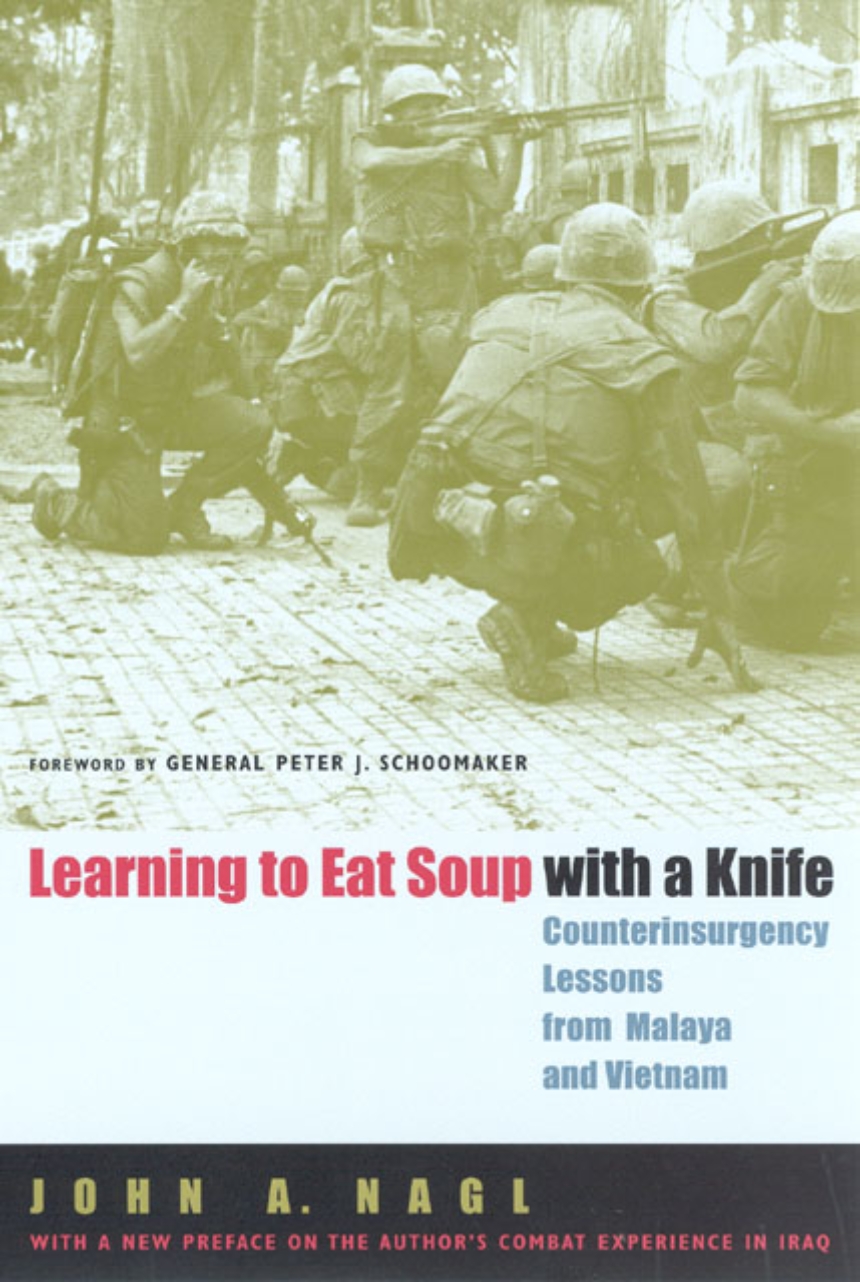Learning to Eat Soup with a Knife
Counterinsurgency Lessons from Malaya and Vietnam
Invariably, armies are accused of preparing to fight the previous war. In Learning to Eat Soup with a Knife, Lieutenant Colonel John A. Nagl—a veteran of both Operation Desert Storm and the current conflict in Iraq—considers the now-crucial question of how armies adapt to changing circumstances during the course of conflicts for which they are initially unprepared. Through the use of archival sources and interviews with participants in both engagements, Nagl compares the development of counterinsurgency doctrine and practice in the Malayan Emergency from 1948 to 1960 with what developed in the Vietnam War from 1950 to 1975.
In examining these two events, Nagl—the subject of a recent New York Times Magazine cover story by Peter Maass—argues that organizational culture is key to the ability to learn from unanticipated conditions, a variable which explains why the British army successfully conducted counterinsurgency in Malaya but why the American army failed to do so in Vietnam, treating the war instead as a conventional conflict. Nagl concludes that the British army, because of its role as a colonial police force and the organizational characteristics created by its history and national culture, was better able to quickly learn and apply the lessons of counterinsurgency during the course of the Malayan Emergency.
With a new preface reflecting on the author’s combat experience in Iraq, Learning to Eat Soup with a Knife is a timely examination of the lessons of previous counterinsurgency campaigns that will be hailed by both military leaders and interested civilians.
In examining these two events, Nagl—the subject of a recent New York Times Magazine cover story by Peter Maass—argues that organizational culture is key to the ability to learn from unanticipated conditions, a variable which explains why the British army successfully conducted counterinsurgency in Malaya but why the American army failed to do so in Vietnam, treating the war instead as a conventional conflict. Nagl concludes that the British army, because of its role as a colonial police force and the organizational characteristics created by its history and national culture, was better able to quickly learn and apply the lessons of counterinsurgency during the course of the Malayan Emergency.
With a new preface reflecting on the author’s combat experience in Iraq, Learning to Eat Soup with a Knife is a timely examination of the lessons of previous counterinsurgency campaigns that will be hailed by both military leaders and interested civilians.
Read the preface.
280 pages | 6 x 9 | © 2005
History: American History, Asian History, British and Irish History, Military History
Political Science: Diplomacy, Foreign Policy, and International Relations
Reviews
Table of Contents
Illustrations
Foreword by General Peter J. Schoomaker
Preface to the Paperback Edition
Acknowledgments
Introduction
List of Abbreviations
Part I. Setting the Stage
1. How Armies Learn
2. The Hard Lesson of Insurgency
3. The British and American Armies: Separated by a Common Language
Part II. Malaya
4. British Army Counterinsurgency Learning During the Malayan Emergency, 1948-1951
5. The Empire Strikes Back: British Army Counterinsurgency in Malaya, 1952-1957
Part III. Vietnam
6. The U.S. Army in Vietnam: Organizational Culture and Learning During the Advisory Years, 1950-1964
7. The U.S. Army in Vietnam: Organizational Culture and Learning During the Fighting Years, 1965-1972
Part IV. Lessons from Malaya and Vietnam
8. Hard Lessons: The British and American Armies Learn Counterinsurgency
9. Organizational Culture and Learning Institutions: Learning to Eat Soup with a Knife
Selected Bibliography
Index
Foreword by General Peter J. Schoomaker
Preface to the Paperback Edition
Acknowledgments
Introduction
List of Abbreviations
Part I. Setting the Stage
1. How Armies Learn
2. The Hard Lesson of Insurgency
3. The British and American Armies: Separated by a Common Language
Part II. Malaya
4. British Army Counterinsurgency Learning During the Malayan Emergency, 1948-1951
5. The Empire Strikes Back: British Army Counterinsurgency in Malaya, 1952-1957
Part III. Vietnam
6. The U.S. Army in Vietnam: Organizational Culture and Learning During the Advisory Years, 1950-1964
7. The U.S. Army in Vietnam: Organizational Culture and Learning During the Fighting Years, 1965-1972
Part IV. Lessons from Malaya and Vietnam
8. Hard Lessons: The British and American Armies Learn Counterinsurgency
9. Organizational Culture and Learning Institutions: Learning to Eat Soup with a Knife
Selected Bibliography
Index
